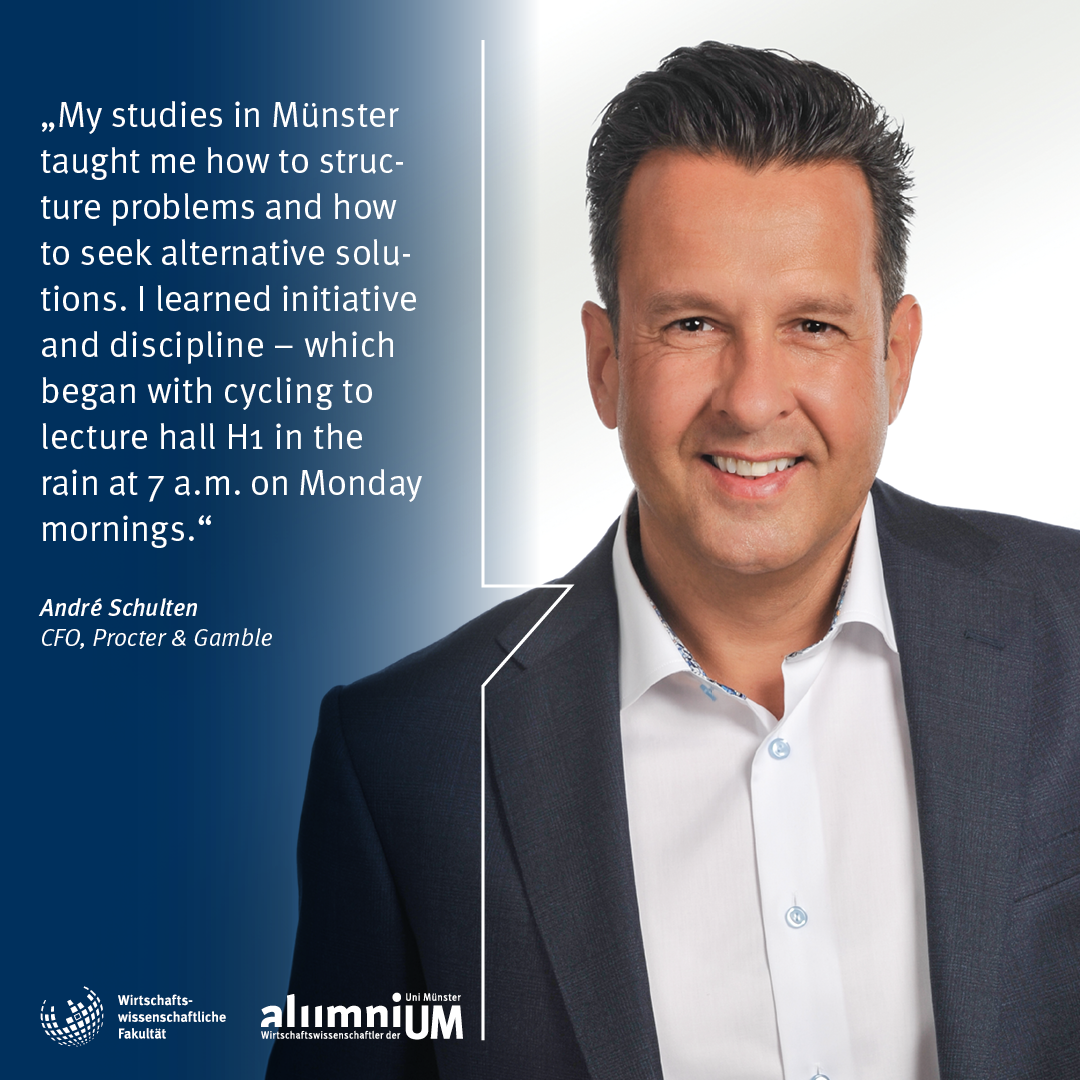Alumni Story: André Schulten

What does the daily work life of a Chief Financial Officer at Procter & Gamble look like? We asked André Schulten this and other questions in our interview. After studying Business & Operations Research at the School of Business & Economics at the University of Münster, André Schulten began his career at P&G Germany as a Cost Analyst and Manager of Finance & Accounting. Today, he serves as P&G’s Chief Financial Officer for the world’s largest consumer goods manufacturer, based in Cincinnati, Ohio. Throughout his career at Procter & Gamble, he has worked in seven different business units, ranging from baby diapers to luxury cosmetics. These roles took him from Münster to Frankfurt, to Cincinnati, to Geneva, and to Singapore.
Dear Mr. Schulten, how can we imagine your daily work routine? What are your responsibilities as the Chief Financial Officer at P&G?
The tasks are varied and not always predictable. Primarily, it involves the strategic direction of the global company—deciding in which product segments and countries we should be present. This involves ensuring that we can achieve solid growth in 10-20 years and that our resources (both human and financial) are used today in a way that secures or creates growth opportunities for the future. What new challenges require a strategic rethink—how, for example, do we integrate environmental sustainability into our growth model? The operational business is managed within the product segments, and as difficult as it is, it is my task to stay out of the operational business, which I almost always manage to do. A significant portion of my time is reserved for discussions with the board, investors (sell and buy side), media, politicians, and other stakeholders, both in board meetings, quarterly earnings calls, and at conferences. Business planning, accounting, treasury, tax, and internal controls are part of my responsibilities. Working with the teams to strengthen, simplify, and automate governance, reporting, and control systems and processes within the company is a critical part of the job. Talent planning and talent development are important elements. P&G has a “promote from within” culture. Therefore, we as a team spend a lot of time recruiting and developing the best talents. This means job planning, lots of coaching, and plenty of contact with all parts of the 105,000-employee organization—many trips, many town halls, many one-on-ones. The unpredictable part of the job is called crisis management—with operations in 140 countries, the next small or large crisis is never far away.
You have already worked in Singapore and Switzerland. What particularly attracted you to the position in Ohio?
The responsibility of the CFO job was naturally the incentive to return to Cincinnati and help shape a company like P&G together with the executive team. To address the geographical aspect of the question—we have always enjoyed moving to a new part of the world, getting to know the people, culture, and history from firsthand experience. We had to learn to be more open to different perspectives, different cultural norms, and different priorities—and anyone who knows people from Münsterland knows that this ability takes work. Every place we have lived and worked in has been fascinating in its own way, but you have to embrace it. “Live as if you want to stay forever,” my manager advised me when we embarked on our first overseas adventure—and that’s what we did.
What advice would you give to today's students?
I would give them the same advice I try to convey to our employees. "It’s not so important what you have learned so far. It’s extremely important that you never stop learning." This means those who are ready to learn something new every day and forget their past successes will have more opportunities than others. "Just do it." We tend to overthink things for too long and with too much complexity. We are better at recognizing distant barriers than possible solutions. So, get closer—then you can see better what is needed. "We have one mouth and two ears"—you must learn to listen better, one of my best bosses told me years ago. If the consumer doesn’t buy your product, you haven’t listened or understood what the consumer needs. If you think the other party in a negotiation is incompetent, you don’t understand what they really want. Leadership is not about saying a lot but understanding what the situation requires. That only works by listening.
When you think back to your time in Münster, what do you think of…?
...long seminars in F1, the Blechtrommel (I believe it’s no longer there, right?), summer evenings on the Aasee meadow, cold feet when cycling in winter. (Editor's note: The Blechtrommel is today the Bohème Boulette)


